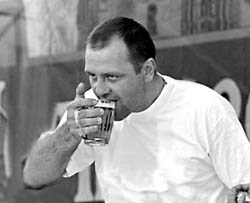Government to Decide How Politicians Will Cash In

Many of us still remember the times when one could earn serious money on carbonated water and beer foam. The more foam in a glass or a jar, the less Soviet citizens relished the real thing. Now the horizons are different. Instead of making a small profit on foam, one can make a fortune on beer. For example, the Obolon Brewery gained a net profit of about UAH 120 million in 2001, up 76.4% or UAH 58 million on the year 2000. This further intensifies competition on a market where the interests of powerful domestic and foreign producers meet and cross. And this is good, especially for enthusiasts of the suds. The keener the competition, the lower and more stable prices.
Yet, competition sometimes shows rather an unexpected twist. For example, on April 5 the Donetsk Sarmat Brewery, one of the top five beer producers in Ukraine, confirmed it will buy the controlling shares of Obolon Inc., this country’s leading manufacture of the frothy beverage. According to Sarmat General Manager Stanislav Melnyk, no obstacles in registering the stake acquired by Sarmat will keep the coal miners from gradually obtaining all their rights as a co-owner of Obolon Inc. As Mr. Melnyk told Ukrayinski novosti, the Keramet-Invest company has already bought more than 10% of Obolon stock. The Donetsk top manager claims the shares are being purchased legally, with anybody, including an Obolon shareholder, having the right to sell his shares. Mr. Melnyk announced Sarmat wants to acquire Obolon in order to become the largest operator with a 35% share on the beer market. (In addition to the parent company, the Donetsk Beer Group also includes the Crimean, Luhansk and Poltava breweries, Kyiv Brewery No. 1, and the Dnipropetrovsk Brewery, all of them reportedly accounting to about 13% of the beer market). “Nobody is going to drop or destroy any trademark. Two trademarks are normal,” Mr. Melnyk said. “Sarmat is mostly represented in the east and south, while Obolon has made a major breakthrough in the center, west, and north. Why not merge?”
The attempt to make this question rhetorical and thus to easily get a positive answer looks a bit tongue in cheek. It makes no difference, of course, for beer bellies who controls the brew. What does make a difference is the product’s quality and price. It is clear in this situation that these people’s interests can be somewhat infringed, for monopolists never take into account the interests of buyers when setting their price policies.
As Vyacheslav Kozlov, a top official at the Antimonopoly Committee of Ukraine, told The Day, Article 12 of the Ukrainian law On Protecting Economic Competition sets out that 35% is already a monopolized segment of a market, so the committee must consider granting permission to own this segment. To obtain permission, an enterprise should prove it is not a monopolist. Moreover, the top official says, the committee is not authorized at all to grant permission to monopolize the market. Yet, the law says the government has the final say in this matter.
Meanwhile, Obolon management accuses Sarmat of attempting to seize the company by unlawfully buying its shares rather than of monopolization. As Oleksandr Slobodian, honorary president of Obolon Inc., said last Tuesday, Sarmat has already via Keramet- Invest bought about 5-7% of Obolon shares. (Obolon’s presence on the Ukrainian beer market rose last year from 27.1 to 27.6%. The enterprise also owns the controlling interests in breweries in Sevastopol, Okhtyrka, and Bershad). Mr. Slobodian emphasized he considered the purchase illegal (at a rate that exceeds fivefold the nominal share value of 100 hryvnias) because the corporate statute allows buying and selling shares only within the company. Obolon’s top executive said the company would sue its shareholders who had sold their shares to the rival. Meanwhile, Natalia Zavhorodnia, advisory section chief at the corporate finances department of the State Commission for Securities and Stock Market, told The Day the law imposes only one restriction on the purchase and sales of corporate shares. According to Ms. Zavhorodnia, shares must not be floated by subscription or on an organized securities market. At the same time, the expert said, shareholders are not forbidden to sell their shares: they can do so freely.
This explanation sheds light on why Mr. Slobodian has to say that the company will also try to solve the problem “on the political level.” It is not so difficult to surmise that the roots of this problem lie precisely in political struggle and the post-election situation. The Ukrainian businessmen involved in big-time politics demonstrate, as usual, their inability to strike deals. Will the government manage to make them coordinate their interests and what will it get in return from the politicians?
INCIDENTALLY
On April 3 Obolon Inc. failed to hold a shareholders’ meeting because only 35% of its shares were registered. The brewer’s shareholders are discontented over the nonpayment of dividends and are afraid that the corporation’s shares will lose their current value following a planned additional emission. Meanwhile, some of those who have sold their shares are being barred from work.






